Community-supported agriculture vs corporate supermarkets: Maresa Bossano of the UK CSA Network
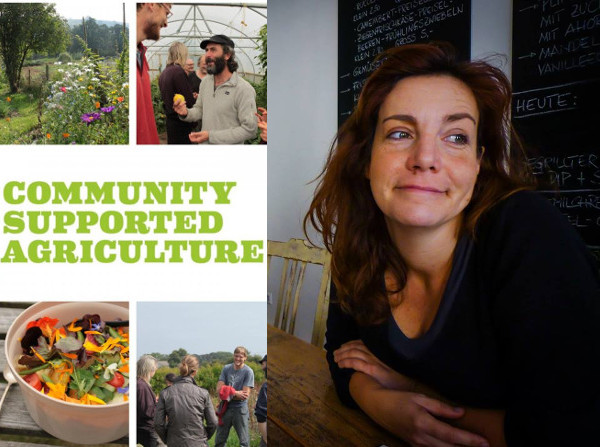
This is part 2 of an interview with Maresa Bossano, who is the co-ordinator for the Community-Supported Agriculture Network in the UK. Part 1 is here.
We’re interested in CSA as a way to reduce market share for multinational corporations. Is that something that’s important to you?
Yes – I don’t trust the products in supermarkets. I don’t trust them to do the right thing with food – and so that’s why I don’t shop there. If you buy direct from a farmer, especially one you can visit and work with, you know exactly what you’re getting. Packaging is less than from a supermarket too. Plus, you’re giving your money straight to the farmer, so you know where your money’s going – whereas if you’re giving your money to a corporation, it’s going to shareholders, who are just sucking money out of communities and away from growers. Also, a small farm will spend its money locally, often buying from other small, local businesses, so everyone gets a boost, it helps local employment and your money stays in your community longer.
Something we want to do with NonCorporate is to help co-ordinate different sectors of the non-corporate economy so that we can all support each other.
Well, I have two friends in Hastings. One runs a local veg box scheme and one runs a local community energy scheme. They know each other, and help each other when it comes to promotion etc. There was a community energy workshop and survey recently and people got a free veg box for taking part.
But I still have friends who actually talk a lot about making the world a better place, but happen to drop into the conversation that they were shopping in a supermarket. When I ask them why they’re shopping at supermarkets, sometimes they’ll say that CSA or veg boxes are for middle-class do-gooders, and it’s only a thing for the rich. They also think that farmers are rich – not realising that industrial farmers can be rich, but small farmers tend to be poor.
I think they really misunderstand how the economy works – just assume that people on low incomes have to shop in supermarkets because they have no choice. But as I said, CSA veg is generally cheaper than supermarket equivalents, and if that’s their attitude, then they’re going to keep helping supermarkets rip off small farmers in this country and in poorer countries.
And of course supermarket workers get minimum wage, but that’s only because they have to pay minimum wage. If they didn’t, they’d give more to shareholders and even less to workers.
I’m a single parent on a low income, and I buy local, organic food, and look for quality, so when friends claim that they can’t afford it, and that I must be rich somehow, it really annoys me – especially when you see the other things that people spend money on. I also appreciate that it is unaffordable for some on very low incomes or with large families.
Yes, for my brother (sorry bro), organic food or switching to the Phone Co-op are unaffordable, but £150 boots and a TV the size of a barn door are affordable. Priorities, I suppose.
I’m involved in setting up a CSA project where all members will be experiencing food poverty, and / or suffering from diet-related illnesses. They will be referred either by GPs or food banks. We will give them free vegetables for a year, and cooking classes. We hope to get funding for it, but in the long term, if we can prove that it saves the NHS or the local authority money, we can ask for the funding to be extended. Especially with Type 2 diabetes, providing fresh fruit and veg can change things a lot.
We interviewed a GP recently who was pointing out the health benefits of gardening / growing food, which could help reduce the need for corporate drugs. He’d be interested in what you’re doing with the CSA Network, I’m sure.
It doesn’t make sense that bad diet is costing the NHS millions, whilst farmers are squeezed to produce unhealthy food cheaply which results in big profits for supermarkets and drug companies. There really are alternatives, and those alternatives will work out cheaper – which is the really crazy thing – as well as socially and environmentally beneficial.
What about Abel & Cole?
Well, they’ve helped switch a lot of people to organic food, which is a good thing, but a lot of their customers believe that they’re getting local food, but they’re not, and because they have shareholders to serve, they’re going to suck money away from the local community . Plus they can out-compete local schemes because of their range and service, which is good – so in the end, they might well be a barrier to the development of genuinely local, non-corporate schemes. I’d encourage people to use a local veg box provider if they have one.
And Riverford – I’ve heard they’re switching to employee-ownership.
Yes, it’s now worker-owned. Again, a lot of their stuff isn’t always local, and they do take customers from smaller schemes, but they’re doing the right thing with worker-ownership. The big players just change the concept of CSA / local veg boxes though, and people still think they can get whatever they want, all-year-round, which racks up the food miles – rather than eating mostly fresh, local food that’s in season.
We get a weekly fruit and veg bag from Sutton Community Farm, just outside London, and sometimes they’ll include fair trade bananas, for example.
I think it’s fair enough, because people aren’t going to stop eating bananas, so they may as well get them from small farmers, paid a fair price, and sold via a CSA / veg box rather than a supermarket. If it helps box schemes survive, great. I don’t have a problem as long as people are clear about what they are buying.
Do you have any thoughts on how we might be able to co-ordinate the non-corporate sector?
I think if key organisations talked to each other occasionally, that would be good. Maybe you could organise a summit for the main players on the non-corporate side of things, that might be good – but quite small scale, because I think when you have large-scale events, it all tends to split into workshops and there are just too many things to think about and people to talk to.
I’ve talked with several people working for key organisations and they’ve said more-or-less the same thing. I think it’s something we should organise for next year. I think you’re right about size, and about not having pre-determined workshops. I find that the most interesting conversations you have at events are the unstructured ones in the pub afterwards.
The thing I’d most like to say around the idea of building a non-corporate economy is that supermarkets want to sell their processed foods, so they’ve convinced people that they’re too busy to cook – that there’s something else, more important that they should be doing, and so they’ve promoted ready-meals as a good thing.
Once people fall for that, they start to lose the ability to cook, and then they have to rely on processed, corporate food. Everything about that attitude is wrong, from environment and communities to health and jobs.
So many people buy sandwiches, and I just can’t understand that. Why would you buy a sandwich when you can make one? It will be much cheaper, not cased in plastic, and (hopefully) won’t be funding a corporation.
So one of the most important things to do in terms of a sustainable food sector is to teach people how to cook.
To change to a healthy diet, it’s fundamental. If people try to achieve good health by buying processed health food, first, it’s not that healthy, second, it’s very expensive, and third it’s over-packaged. It’s the same with a lot of vegan foods too – processed, over-packaged and transported large distances. There’s no reason we can’t produce local, fresh, whole vegan food in the UK, rather than processed food with a lot of food miles. It’s perfectly easy to make oat milk at home, for example – just add water to oats, let them stand, whisk it up and strain it. Whether you’re a vegan or an omnivore, let’s get food from local, organic, small-scale suppliers rather than giant supermarkets.
Let us know if there’s any news in your sector that you’d like people to know about.
We’ve got our AGM coming up soon. We’re having it in London at the ‘We Feed the World’ exhibition. It’s at the Barge House for a week-and-a-half and it showcases small farmers from all over the world. We don’t want just CSA people to come. We’d also welcome people working in other sustainable or non-corporate fields.
OK Maresa, hope you have a good AGM and I’ll speak to you again soon.
Highlights:
- With CSA, you’re giving your money straight to the farmer, so you know where your money’s going – whereas if you’re giving your money to a supermarket, it’s going to shareholders, who are just sucking money out of communities and away from growers.
- CSA veg is generally cheaper than supermarket equivalents.
- Once people fall for supermarket advertising, they start to lose the ability to cook, and then they have to rely on processed, corporate food. Everything about that attitude is wrong, from environment and communities to health and jobs.
Find the original post here on our sister site NonCorporate.org.
The views expressed in our blog are those of the author and not necessarily lowimpact.org's
1 Comment
-
1John Harrison January 13th, 2019
Anything that supports small-scale farming and local, seasonal food is a ‘good thing’ in my book. I’m afraid the reason our food supply system is where it is now are deeper rooted than the supermarket’s advertising. Unforeseen consequences of good intentions by post WW2 governments, coupled with globalisation and an educational system that depreciates the value of providing life skills like the ability to cook a decent meal from basic ingredients in favour of food technology.
We’ve travelled an awfully long way down what has turned out to be the wrong road.




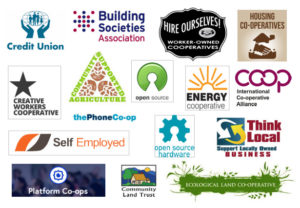 Let’s build a sustainable, non-corporate world; but what exactly does ‘non-corporate’ mean?
Let’s build a sustainable, non-corporate world; but what exactly does ‘non-corporate’ mean?
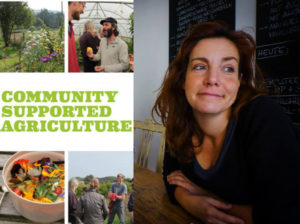 How do we grow the community-supported agriculture sector? Maresa Bossano, co-ordinator of the UK CSA Network
How do we grow the community-supported agriculture sector? Maresa Bossano, co-ordinator of the UK CSA Network
 How superstores destroy jobs and local resilience
How superstores destroy jobs and local resilience
 Job opportunity: fancy delivering veg boxes for Sutton Community Farm?
Job opportunity: fancy delivering veg boxes for Sutton Community Farm?
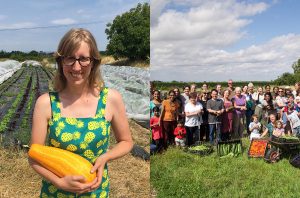 Why community farms are such a good idea: Alice Brown of Sutton Community Farm (Part 1)
Why community farms are such a good idea: Alice Brown of Sutton Community Farm (Part 1)
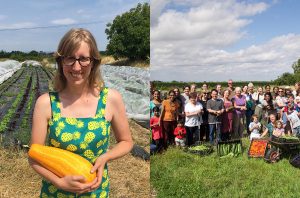 The future of community-supported agriculture: Alice Brown of Sutton Community Farm (Part 2)
The future of community-supported agriculture: Alice Brown of Sutton Community Farm (Part 2)
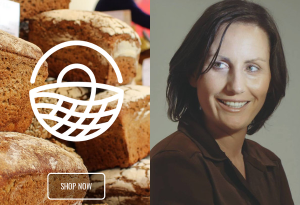 How the Open Food Network helps local food producers: interview with Lynne Davis (Part 1)
How the Open Food Network helps local food producers: interview with Lynne Davis (Part 1)
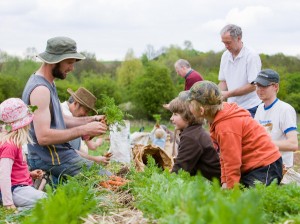 Community-supported agriculture
Community-supported agriculture
 Low-impact cooking
Low-impact cooking
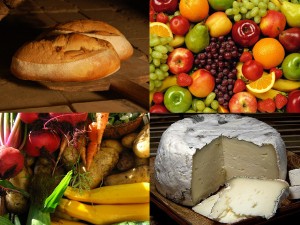 Low-impact food & drink
Low-impact food & drink
 Low-impact shopping
Low-impact shopping
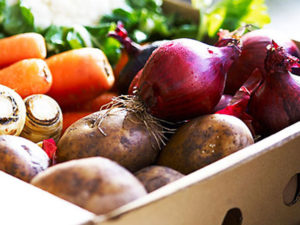 Veg box schemes
Veg box schemes


